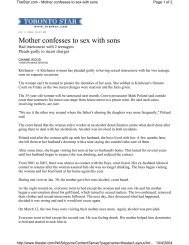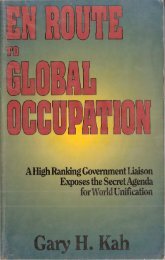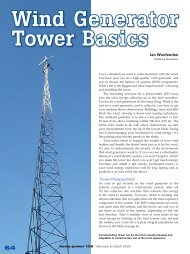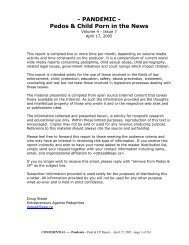G. Edward Griffin - The Fearful Master - PDF Archive
G. Edward Griffin - The Fearful Master - PDF Archive
G. Edward Griffin - The Fearful Master - PDF Archive
Create successful ePaper yourself
Turn your PDF publications into a flip-book with our unique Google optimized e-Paper software.
12. Lessing, p. 143.<br />
13. Senator Thomas Dodd, Congressional Record (September 8, 1961).<br />
14. Ibid., (September 16, 1961).<br />
15. Article entered in the Congressional Record by Senator Thomas Dodd (September 13,<br />
1961). <strong>The</strong> Communist record of Gizenga, Adoula's vice-premier, was so well known that<br />
it embarrassed western supporters of the regime. As his pro-Communist bias became<br />
more and more difficult to conceal, it was decided to "arrest" Gizenga as proof of the<br />
central government's anti-Communism. Supporters of UN policy in the non-Communist<br />
world received much mileage from this maneuver. What most people were not allowed to<br />
learn, however, was that Gizenga was quietly set free soon afterward. According to<br />
Philippa Schuyler, his "prison" was a comfortable villa by the sea. Even Adlai Stevenson<br />
refrained from saying that Gizenga was in jail. In an article distributed by the UN<br />
association in Los Angeles, he is quoted as saying that Gizenga had been under "house<br />
arrest." See "Stevenson Answers Critics on Congo," Los Angeles Times (February 10,<br />
1963).<br />
16. "Adoula Receives Royal Welcome," the Tablet (Brooklyn, February 17, 1962). As this<br />
book is going to press, the elections in the Congo are nearing. Since the basic sentiments<br />
of the masses of Congolese people (as distinguished from many of their leaders) are anti-<br />
Soviet, the Adoula regime has recently put on a rather convincing show of anti-<br />
Communism in its public pronouncements. It has even expelled the Communist<br />
embassies from Leopoldville. Whether or not this appearance of anti-Communism will be<br />
dropped after the elections or whether it represents a true stiffening of Adoula's political<br />
backbone, will remain to be seen.<br />
17. Department of State Bulletin (November 26, 1962), pp. 804-806.<br />
18. Department of State press release #893 (December 19, 1961).<br />
19. Department of State Bulletin (February 26, 1962), p. 335. Shortly after the<br />
assassination of President Kennedy in 1963, President Johnson addressed the General<br />
Assembly of the United Nations and confirmed that the change in chief executives had in<br />
no way altered the official United States attitude toward the UN. President Johnson said,<br />
"More than ever we support the United Nations. . . ." <strong>The</strong> only noticeable difference was<br />
that the-New England twang had been replaced by a Texas drawl. See "Text of Johnson's<br />
Speech to UN," Los Angeles Times (December 18, 1963), sec. 4, p. 2.


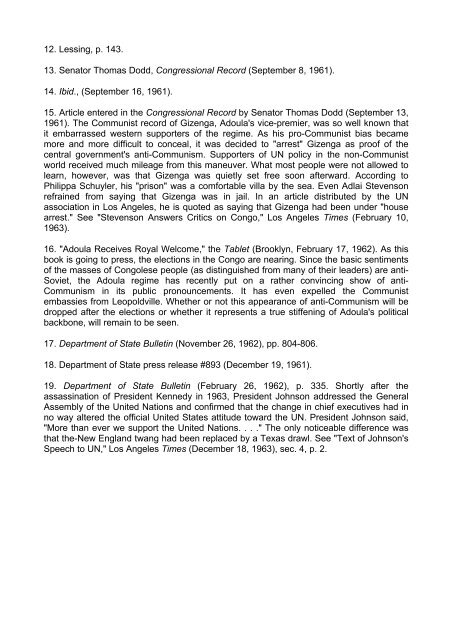
![Robert T McQuaid [rtmq@stn.net] Sent: Friday, October 29, 2004 12 ...](https://img.yumpu.com/51070071/1/190x245/robert-t-mcquaid-rtmqstnnet-sent-friday-october-29-2004-12-.jpg?quality=85)



